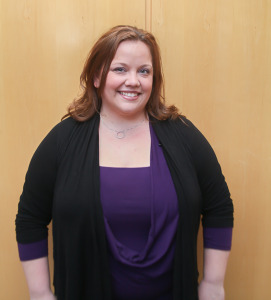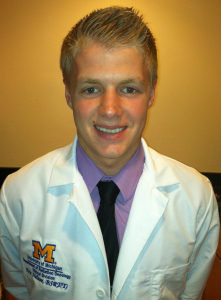
 Aldrich and Nelson are both currently employed as Radiation Therapists at the University of Michigan Radiation Oncology Department. Radiation therapists are responsible for carrying out cancer targeting treatment plans created by radiation oncologists. The department treats 20 to 30 patients each day with radiation producing machines called linear accelerators. Positioning the patients for treatment and verifying that they are treating the correct area is the most important part of their job. This is done with a variety of immobilization devices, daily x-rays, and motion tracking systems. Aldrich and Nelson took time from their busy professional schedules to tell us about their experience so far in the field.
Aldrich and Nelson are both currently employed as Radiation Therapists at the University of Michigan Radiation Oncology Department. Radiation therapists are responsible for carrying out cancer targeting treatment plans created by radiation oncologists. The department treats 20 to 30 patients each day with radiation producing machines called linear accelerators. Positioning the patients for treatment and verifying that they are treating the correct area is the most important part of their job. This is done with a variety of immobilization devices, daily x-rays, and motion tracking systems. Aldrich and Nelson took time from their busy professional schedules to tell us about their experience so far in the field.
Describe a typical day on the job.
Aldrich: At the University there are 5 machines treating patients. We figure out what machine we are assigned to everyday because assignments can change. Once we get to the machine we overlook the whole day and figure out which patients were treated on different machines and if they need any immobilization devices to treat them. If they do we gather them in between treating patients as the day goes on. We also make sure we have everything we need if we have a new start. A typical treatment for a patient starts with us setting up the room with everything that particular patient needs for treatment. This includes verifying the prescription and if the treatment plan pulls up correctly. Once everything is set up and the script looks good we get the patient and begin the process of setting them up for their own individualized treatment. There are many different things that you have to pay attention to in order to know that the patient is going to get the best treatment.
What are the highlights of your job?
Nelson: Interacting with patients is the best part about being a radiation therapist. Each patient takes an average of 30 minutes for their daily treatment and is treated every day for 2-4 weeks. Because of this, we develop relationships with the patients. Many interesting stories are shared and bonds built. Patients put their trust in your hands during a very difficult point in life.
Aldrich: Getting to know the patients and know that you are helping them in a difficult time in their life. Once they get through it and come back for the follow up they come see you and say “hi” and let you know how they are doing after the treatment. You know you have made a great impact on their life.
What are the challenges of your job?
Aldrich: The University is very diverse and you work with many different people and have to learn their personalities and how they work. In order to have great team work you have to be able to roll with variations and still ensure the patient is getting consistent treatment.
Nelson: Being a radiation therapist requires a lot of concentration and personality. Your ability to make split second decisions and weigh many different factors is what can make or break you in this field. You will come across many different types of patients, young and old. Some will be very sick, some will appear to be fine. Some patients will be angry, some will laugh, some will cry, and some will not say but a few mumbles. Treating patients extends outside of the medicine you give them or the treatments you apply. People require emotional and psychological support when struck with traumatic life experiences, and having cancer is certainly no walk in the park.
What advice would you give to future Radiation Therapists?
Nelson: Be ready to work hard. Radiation therapy has become a competitive field. The radiation therapy program requires a lot of time and energy. As a student, there were weeks that I spent 70 hours in the hospital. Do not let these thoughts scare you away though. I have been blessed with the greatest job in the world and truly love what I do. The hard work pays off. When a patient comes back for a follow up appointment and tells you that he/she is cancer free, you will never forget it.
Aldrich: Hard work will pay off in the end, just keep chasing your dream!